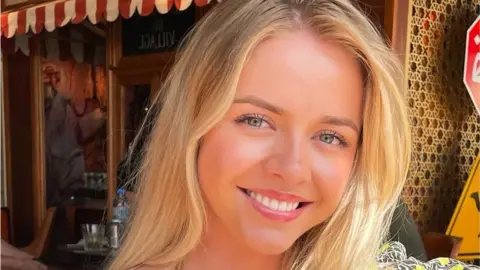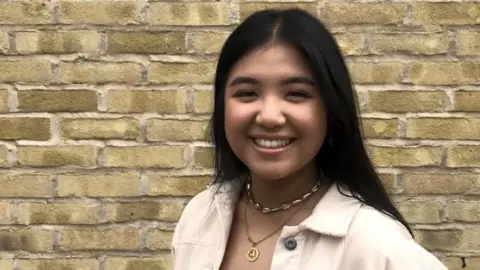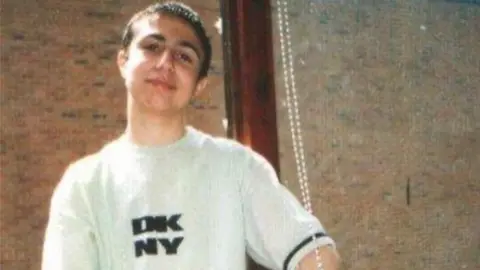Being proud of going to state school
 Sophie Pender
Sophie PenderA campaign is asking people who went to state school to shout about it. So why is it needed?
"Before going to Bristol University, I'd grown up on a council estate, worked two jobs, at McDonald's and John Lewis, alongside my studies, and lost my father to substance abuse.
"When I got the straight A*s needed to get into Bristol, I thought it was going to be a real turning point in my life - that my upbringing would be less important than my ability," Sophie Pender says.
But the founder of the 93% Club - an organisation set up to create opportunities and networks for people who went to state, rather than private, school - found that was far from the case.
Sophie says her accent was mocked, people would "grimace at the fact I grew up on a council estate" and she found herself trying to distance herself from her working-class background in order to be accepted.
 Sophie Pender
Sophie PenderUniversity brought with it the same nasty surprises for Caroline Manakit too.
She grew up in Durham as an only child to Thai parents.
Money was tight. Caroline worked in the school canteen for extra money for the family. She suffered racism and was on free school meals.
And when she won a place to study philosophy at York University, Caroline says, she felt she had received a "golden ticket" away from those struggles.
 Caroline Manakit
Caroline ManakitBut from the very first day, she felt like an outsider.
"I struggled to fit in, despite gaining a place at the same university as my privately educated peers," Caroline says.
"I already knew that I lacked the economic capital - they talked about holidays and the type of restaurants they would set foot in.
 Caroline Manakit
Caroline Manakit"But what was more heartbreaking was they already had their foot in the door with employers, because of their parents' networks and the opportunities they'd already gained at school.
"I went to a careers fair in my first year not knowing how to dress or present myself in front of employers and it made me believe that it wasn't even worth putting a job application in."
Both Caroline and Sophie say they wish something like the State School Proud campaign had existed to help them with their starts at university.
They want it to be an act of solidarity for state-educated students and professionals but also a way of starting conversations about the virtues that can come from being state educated - like having often tackled hardship to reach success.
The campaign organisers are also asking high-profile names to talk about their background.
Posh people
Bafta-winning actor Adam Deacon grew up on a council estate in Hackney, east London.
When he started acting, he was sure his background and life experience would be an advantage.
He was cast in the hit film Kidulthood as Jay - a "rough, loud, council estate, working-class character".
And after the success of the film, he presumed it would open doors - but the deeper he went into the acting world, the more his background became a problem.
Casting directors found him "scary", he was told.
He'd arrive at castings and realise the room was full of "really posh people who had spent a fortune on their education".
 Adam Deacon
Adam DeaconAnd when he beat Eton-educated actors Eddie Redmayne and Tom Hiddleston to a rising-star Bafta in 2012, Adam says, the media coverage about his working-class background was constantly reaffirming how different he was.
Photographers wanted to do shoots on his council estate or at his old state school.
"Would they have asked Eddie Redmayne to do his photoshoot at his old school?" he asks.
The industry felt full of politics Adam didn't always understand - directors and agents who had attended the same school, which he'd not heard of.
"I've just always felt a bit unwanted - like I should be grateful to be here," he says.
 Getty Images
Getty ImagesAdam says the industry is very slowly starting to change and he now might meet someone on set who talks like him but more progress needs to be made.
"You should be proud of where you've come from, regardless," he says.
"If there are actors out there that are from state school, they need to shout about it so that other people have role models and know they can make it too.
"But it does take confidence, because I know it can go against you in the industry."
Socioeconomic background
Sophie describes the 93% Club as the "reverse Bullingdon Club" - the opposite of the private male-only dining club at Oxford University whose past members include David Cameron, George Osborne and Boris Johnson.
Despite representing 93% of the population, "state-educated students struggle to see themselves reflected in the UK's decision makers, chief executives, actors, artists and the like", she says.
"Truthfully, when many state-educated people reach the pinnacle of their careers, they've often dispensed with their state-school identity," Sophie says.
"Our socioeconomic background is not obvious on the surface.
"It's a characteristic that we are able to mask if we need to - and that needs to stop."
